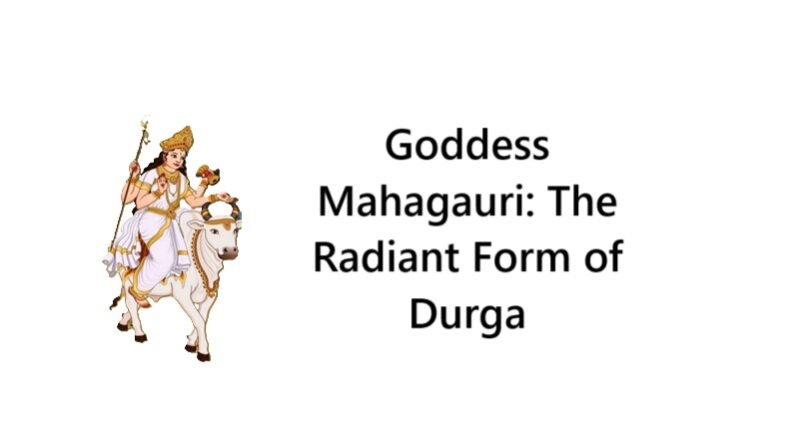Goddess Mahagauri: The Radiant Form of Durga
Origin
According to Hindu mythology, Goddess Shailputri, at the age of sixteen, was extremely beautiful and blessed with a fair complexion. Due to her extraordinary fairness, she was revered as Goddess Mahagauri. Her name “Mahagauri” translates to “extremely fair,” signifying her pure and divine essence. She is one of the nine forms of Goddess Durga and is worshipped on the eighth day of Navratri.
Navratri Worship
Goddess Mahagauri is worshipped on the eighth day (Ashtami) of Navratri. Devotees observe fasting, offer prayers, and seek her blessings for purity, wisdom, and relief from past sins. Worshipping her is believed to eliminate sufferings and bestow peace and prosperity.
Governing Planet
It is believed that the planet Rahu is governed by Goddess Mahagauri. Devotees worship her to reduce the malefic effects of Rahu and to attain spiritual enlightenment.
Iconography
Goddess Mahagauri rides a bull, just like Goddess Shailputri, and hence, she is also known as Vrisharudha (वृषारूढ़ा). She is depicted with four hands:
- One right hand holds a Trishul (trident), representing power.
- The other right hand is in Abhaya Mudra, granting fearlessness.
- One left hand holds a Damaru (drum), symbolizing rhythm and creation.
- The other left hand is in Varada Mudra, bestowing blessings upon her devotees.
Details
As her name suggests, Goddess Mahagauri is extremely fair. Her complexion is compared to a conch shell, the full moon, and the white Kunda flower (कुंद). She is always adorned in white garments, earning her the name Shwetambardhara (श्वेताम्बरधरा).
Devotees believe that worshipping her purifies the soul and removes all previous sins. She represents serenity, peace, and endurance.
Favourite Flower
Goddess Mahagauri’s favorite flower is the night-blooming jasmine (रात की रानी), symbolizing beauty and purity.
Mantra
ॐ देवी महागौर्यै नमः॥
Prarthana (Prayer)
श्वेते वृषेसमारूढा श्वेताम्बरधरा शुचिः।
महागौरी शुभं दद्यान्महादेव प्रमोददा॥
Stuti (Hymn of Praise)
या देवी सर्वभूतेषु माँ महागौरी रूपेण संस्थिता। नमस्तस्यै नमस्तस्यै नमस्तस्यै नमो नमः॥
Dhyana (Meditative Visualization)
वन्दे वाञ्छित कामार्थे चन्द्रार्धकृतशेखराम्।
सिंहारूढा चतुर्भुजा महागौरी यशस्विनीम्॥
पूर्णन्दु निभाम् गौरी सोमचक्रस्थिताम् अष्टमम् महागौरी त्रिनेत्राम्।
वराभीतिकरां त्रिशूल डमरूधरां महागौरी भजेम्॥
पटाम्बर परिधानां मृदुहास्या नानालङ्कार भूषिताम्।
मञ्जीर, हार, केयूर, किङ्किणि, रत्नकुण्डल मण्डिताम्॥
प्रफुल्ल वन्दना पल्लवाधरां कान्त कपोलाम् त्रैलोक्य मोहनम्।
कमनीयां लावण्यां मृणालां चन्दन गन्धलिप्ताम्॥
Stotra (Hymn of Devotion)
सर्वसङ्कट हन्त्री त्वंहि धन ऐश्वर्य प्रदायनीम्।
ज्ञानदा चतुर्वेदमयी महागौरी प्रणमाम्यहम्॥
सुख शान्तिदात्री धन धान्य प्रदायनीम्।
डमरूवाद्य प्रिया अद्या महागौरी प्रणमाम्यहम्॥
त्रैलोक्यमङ्गल त्वंहि तापत्रय हारिणीम्।
वददम् चैतन्यमयी महागौरी प्रणमाम्यहम्॥
Kavacha (Protective Shield)
ॐकारः पातु शीर्षो माँ, हीं बीजम् माँ, हृदयो।
क्लीं बीजम् सदापातु नभो गृहो च पादयो॥
ललाटम् कर्णो हुं बीजम् पातु महागौरी माँ नेत्रम् घ्राणो।
कपोत चिबुको फट् पातु स्वाहा माँ सर्ववदनो॥
Aarti (Devotional Song)
जय महागौरी जगत की माया। जय उमा भवानी जय महामाया॥
हरिद्वार कनखल के पासा। महागौरी तेरा वहा निवासा॥
चन्द्रकली और ममता अम्बे। जय शक्ति जय जय माँ जगदम्बे॥
भीमा देवी विमला माता। कौशिक देवी जग विख्यता॥
हिमाचल के घर गौरी रूप तेरा। महाकाली दुर्गा है स्वरूप तेरा॥
सती (सत) हवन कुण्ड में था जलाया। उसी धुयें ने रूप काली बनाया॥
बना धर्म सिंह जो सवारी में आया। तो शंकर ने त्रिशूल अपना दिखाया॥
तभी माँ ने महागौरी नाम पाया। शरण आने वाले का संकट मिटाया॥
शनिवार को तेरी पूजा जो करता। माँ बिगड़ा हुआ काम उसका सुधरता॥
भक्त बोलो तो सोच तुम क्या रहे हो। महागौरी माँ तेरी हरदम ही जय हो॥
Read these articles also:

